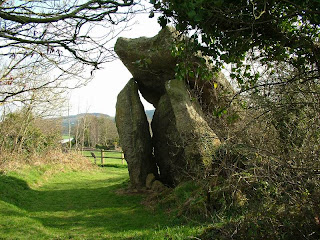 “Erected by Thos. Tobin of Harristown in memory of his Father John Tobin who Dept. this life ye 14th of Febr. 1804 Aged 70. Also of his Children who died young”—
“Erected by Thos. Tobin of Harristown in memory of his Father John Tobin who Dept. this life ye 14th of Febr. 1804 Aged 70. Also of his Children who died young”—A trip today to Harristown to see Mary D., who has lived there all her life and knows its inhabitants. The drive, as our drive to Mullinavat several years ago, was gorgeous. It was a misty day in the morning, giving way to some sunshine by afternoon. The vistas—long sweeping views of hillsides with green fields and barley—were lovely.
We drove up into the Walsh (pronounced Welsh) Mountains and over them to Harristown, which is high, but in a kind of high pastureland looking out onto the higher promontories around. These include Tory Hill, from which one may see four counties.
Harristown itself is a cluster of houses and other buildings at a T road, with the various roads leading to widely separated farms. John commented on the sparseness of population, the distance between the houses, and said it struck him as lonely.
We stopped at a shop to ask directions and were told by the shopkeeper, a Wexford woman who rolled her eyes up to heaven and shut them to count houses in her head, to stop at the fifth house along a certain road. It turned out to be by our count the third house.
Mary D. was a short, stocky blond woman, energetic and friendly, with a thick accent. She used phrases—flusterin’ about (to describe children playing)—and “the heron got a cop on and left.” The latter part of a story about a young heron who visited her place recently, and whom the crows tried to peck to death, until he got a cop on and went into the bogs. John and Maura were surprised and didn’t know the expression, thinking it was American. It’s not Irish, they say.
Mary D. told me of Ryans who once owned the shop at the crossroads—a Willie Ryan now dead, and a Daniel and Mary, none of whom married. Daniel went to
She then took us to two old cemeteries nearby, Muckalee and Killahy. Both were around tiny old churches long gone. John told me that, up to a certain synod in the 1100s (as best I recall), each little civil parish had its own church.
The Muckalee cemetery had recently been sprayed to kill the grass growing in it for a
The cemetery’s on a hillside in a field, with an ancient holy water font, broken and now recently cemented into a stone base by Mary D.’s son. There’s an ivy-covered gnarled old tree in the cemetery. That, the brown grass, the windswept hillside, and the jumble of stones, give it a rather forlorn look.
The Killahy cemetery is about a mile away, also in a field, but tamer looking, with two old trees, huge ones, a cedar and a chestnut, in its center. The stone walls of the ruined church are also much more discernible.
Though I’d found a Tobin in Muckalee, at Killahy I found almost all Grants, with an Aylward or two sprinkled in.
From the cemeteries, we drove back to Harristown, taking a picture of a brightly painted house in the village proper. Beside it is a ruined building, a dark forbidding gray but an imposing structure, which Mary told us was once an RIC constabulary.
Mary insisted we come in for tea: “You’ll have a cuppa and a scone,” and gave us her recipe—a fistful of flour, sugar, margarine, with two eggs and several fistsful of currants. We ate them with delicious strawberry jam she’d made from 15 pounds of strawberries she’d picked earlier in the summer at
After Harristown, a drive back by way of the dolmen, the leac an scail, between Harristown and Piltown. What an impressive sight. It’s on a McCarthy farm, up a little path, where it seems to be waiting there, silent yet speaking deep from the earth. It’s a portal dolmen, appearing from the side like some weird geometric game with huge rocks that seem to rest on others, yet don’t really do so. Only when one walks around to the front does one see the portal.
Then dinner—plaice baked with a tartar sauce inside the crust, fresh peas, boiled potatoes, and rhubarb tart—followed by drinks with the R. friends, Rosemary and Raymond M. Mr. M. seemed very surprised when I asked him if his roots were in




No comments:
Post a Comment